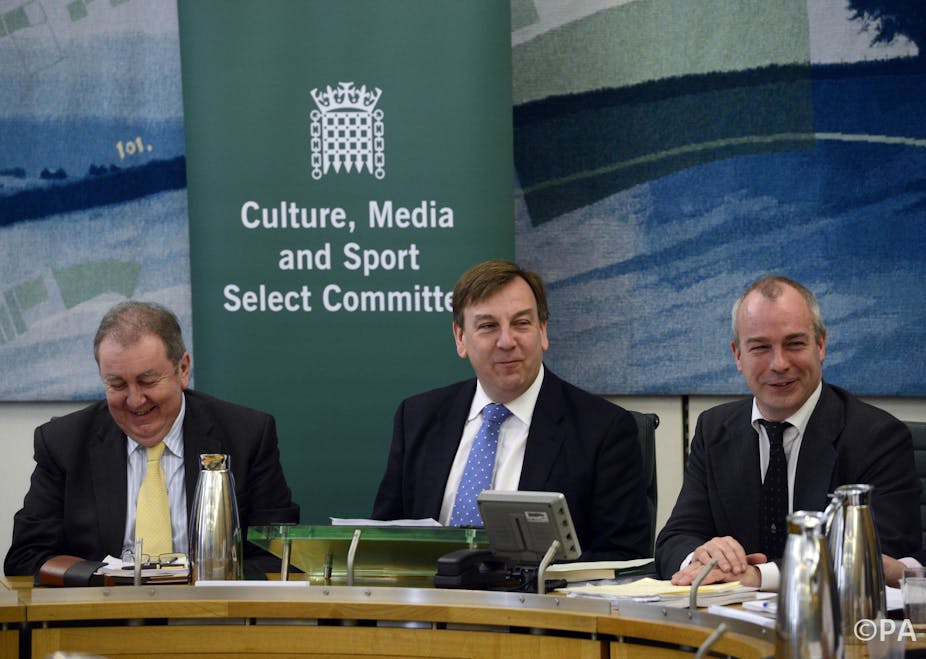Having entirely ignored the Whittingdale story since it first became known about late in 2013, sections of the press were remarkably swift in lining up to denounce Hacked Off as “conspiracy theorists” and as hypocrites for allegedly invading Whittingdale’s privacy. Neither claim is remotely valid.
Let’s be clear about this. The conspiracy exists only in the fevered brains of people such as former News of the World deputy editor Neil Wallis and journalists at the Mail. Anyone reading James Cusick’s exposé of what has been happening over the past year or so (disclaimer: I helped to crowdfund this investigation) would realise that there is not the slightest suggestion of collusion between the four papers which at one time or another had the story. As Cusick explains, each had their own reasons for not running it.
When the story arrived at the Sunday People in November 2013, its parent company, the Mirror Group was still vehemently denying that the Mirror had engaged in phone hacking. Exposing Whittingdale at this point ran the risk of his retaliating by setting up a Department of Culture, Media and Sport select committee enquiry into MGN activity. He had chaired a similar enquiry in the case of News Group – although it’s worth noting that in that case he voted against his own enquiry’s findings that Rupert Murdoch was “unfit to run a major international company”.
Pictures of Whittingdale and Olivia King were next taken to the Sun. But, as DCMS chair, Whittingdale was already making extremely threatening noises about the BBC. Why on earth would a Murdoch paper want to do the slightest thing that might endanger the position of what appeared to be an exceptionally valuable political ally?
According to Cusick, the editor of the Mail on Sunday, Geordie Greig, told his journalists that this was the type of political story that defined great newspapers, and that if the MoS backed off, it had no right to call itself a newspaper. The story was delayed by journalists’ inability to secure a comment from King, which was felt to be legally necessary after Whittingdale had apparently told her to contact the Press Complaints Commission and to demand ahead of publication that the paper show her the material that it possessed. The story was then dropped. One can only wonder why.

In 2014, writes Cusick, the Independent began investigating why the story hadn’t been published – particularly as Whittingdale was now a member of the cabinet. The relationship with King had ended, but there was still the outstanding matter of why Whittingdale had not declared that he and King had visited Amsterdam courtesy of MTV in the Register of Members’ Interests. But the Independent is a tenant of Associated Newspapers and relies on its IT services, canteen facilities, security and so on. After initially appearing interested in the project the editor, Amol Rajan, pulled the plug, without explanation, on October 20, 2015.
The same day both Rajan and Whittingdale spoke at the Society of Editors’ conference, at which the latter dropped the bombshell that he was not “persuaded” by the section of the Crime and Courts Act which enshrines in law the Leveson recommendation that publishers who are not signed up to an officially-recognised press regulator will face the threat of exemplary damages in libel and privacy cases. Since the Independent was not signed up to such a regulator, you could argue that it would clearly benefit from such a measure not coming into operation.
Time to come clean
Of course, some bright spark is absolutely bound to pipe up that this is all simply conjecture. And this indeed has some truth to it, albeit only up to a point. But the conjectures can perfectly easily be disproved by those ultimately responsible for suppressing the story at the four newspapers concerned stepping forward and explaining the reasons for their actions.

Accusations of privacy busting from the British press are so flagrantly hypocritical that they really are beneath contempt. Remember, these are the self-same papers straining at the leash to reveal all about a married celebrity’s private life, which contain not a scintilla of public interest justification.
Had the British press applied its normal “standards” to Whittingdale he would have been plastered all over the front pages long ago. In particular, he is an easy target for charges of hypocrisy, which is one of the factors which make the story a matter of public interest: online dating of a dominatrix doesn’t sit exactly comfortably with membership of the Cornerstone group of Tory MPs (motto: “Faith, Flag and Family”) nor with consistently voting against the liberalisation of Britain’s sex laws.
But the Whittingdale affair has absolutely nothing whatsoever to do with privacy. At its heart is the fact that Whittingdale put himself in a position in which he could be pressured by newspapers into refusing to enact measures – Leveson 2 and the relevant section of the Crime and Courts Act – to which they were vehemently opposed. Whether he was actually pressured, or merely felt pressured, or indeed neither, is entirely irrelevant: there is the clearest possible appearance of conflict of interest – and, in a culture which (in large parts thanks to the press, appearance is all) that is all that matters.

